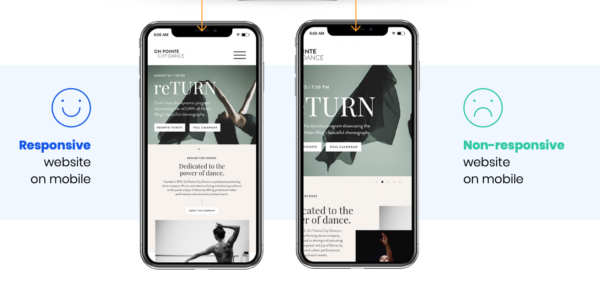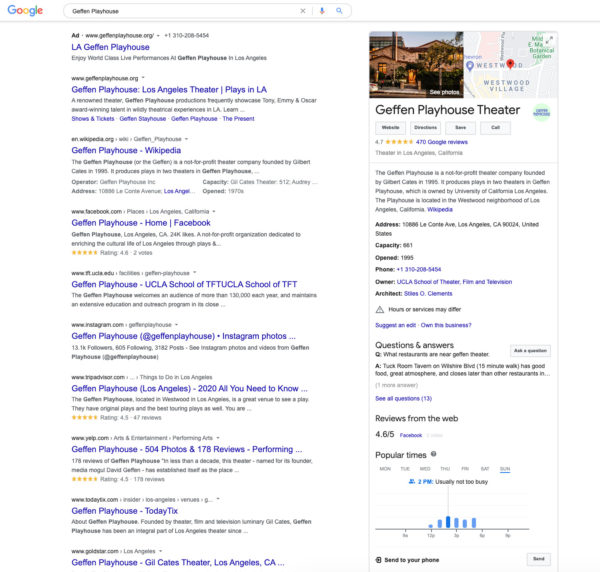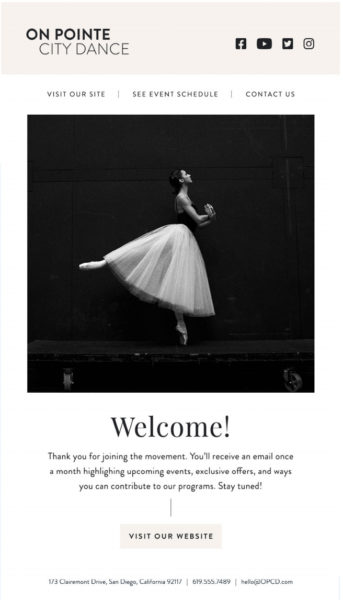
Great theatre marketing is all about attracting prospective theatregoers and attracting prospective theatregoers is all about tapping into your prospects’ sense of curiosity.
In today’s competitive landscape, theatre marketing efforts are your most direct link to a full house. People actively seek out entertainment. If you aren’t using the tools at your disposal to answer this demand, you’ll lag behind the venues and companies that do.
Capturing your prospects’ interest takes time and dedication, but it doesn’t have to be complicated. To appeal to newcomers, earn the loyalty of patrons, and craft an enduring brand identity, you need to:
- Get to know your ticket holders
- Cultivate your online presence
- Optimize your digital reach
- Raise the curtain on digital marketing
Here’s how to get started:
Get the expert marketing advice and tools you need to increase visits and word of mouth.
Get to know your ticket holders
Targeting specific markets focuses your efforts toward the people most likely to attend a performance. Doing this doesn’t exclude a wider, general audience. It ensures that your message more efficiently reaches people with an existing interest.
Start by looking at your current audience. These patrons are more likely to return for a show. Research shows that it costs five times less to market to this group than to engage a new ticket holder. This group’s demographics, behaviors, and interests also offer critical information that shows you who else out there is ready and willing to buy a ticket.
You may already have a good understanding of your current audience base. If not, you could distribute a ticket holder survey, which collects the information you need while gaining insights into how you can improve your service.
Follow up with performance attendees after a show and ask data-gathering questions about an individual’s:
- Age, profession, income, gender, location, or marital status
- Interests, lifestyle, or behaviors
- Feedback on your venue and services
When averaged, these responses can define your target patron. So you’ll know that your marketing efforts are reaching the right crowd. Constant Contact has an online survey tool that allows you to conduct surveys via email.
Cultivate your online presence
Your patrons already turn to the internet as a source of entertainment. They’re on it whether they’re taking a break from work, scrolling through social media, or consuming content. They may even be looking for you directly. Nearly 70% percent of people search for local events, organizations, and businesses at least once a month.
Without a digital footprint, you miss out on capturing people’s attention when they’re online.
Your website
Cornering your share of the virtual world starts with your theatre’s website. Use this space to provide all the answers to questions a visitor might have through:
- A Home page defining your theatre’s mission, offerings, and unique value proposition
- An Events digest page with an up-to-date calendar of shows or programs
- Event landing pages that explore specific details about each event you offer
- A Contact page with clear directions that let people know how to reach you online, buy tickets, and find your venue
As a theatre operator, you understand the power of the visual medium. Make sure this translates on your website by using high-quality and captivating imagery. Your website must be mobile-responsive, as well.

But internet users’ attention can be fleeting. Retain a visitor’s interest through engagement tools on your site like:
- Call-to-action buttons that take people to the next step of purchasing tickets
- Sign-up forms to collect email addresses and give subscribers access to discounts, early bird ticket sales, or exclusive content
- Social buttons that encourage users to engage with your brand
Google Business Profile
About 90 % of people use Google when searching online. The top search engine uses IP addresses to prioritize local businesses and organizations in search results. Completing your Google Business Profile listing makes it easier for the search engine to link your events to a user’s search intent.
Optimizing your Google Business Profile listing helps you attract, engage, and convert potential patrons because you can:
- Position your contact information front and center
- Feature events or programs right on Google’s homepage
- Post images, blog posts, and calendar updates
- Show visitors where you are located on Google Maps
- Collect ticket holder reviews that create strong social proof for your theatre

Local listings
Expand your online real estate by listing your theatre on other sites that drive people’s entertainment decisions, like:
- Yelp
- Local community pages like news sites or city events guides
- Local tourism board and Chamber of Commerce websites
Make sure that all information in your listings is accurate and consistent. Keep an organized catalog of where your listings are active so that when you want to make a change, you can ensure everything gets updated.
Social media
As visually-oriented networks, social media is tailor-made for the arts industry. A social media strategy helps you build brand awareness and engage with your audience more informally and authentically, creating a buzz that can enhance ticket sales.
Each social media channel has its benefits, best practices, and access to individual markets. If you’re just getting started with social media marketing, choose one channel that best fits your market and grow your activity from there. This could include:
- A Facebook business page where you can post informative content and calls-to-action
- Instagram for your most compelling and brand-building visual content
- Twitter to engage in patrons’ conversations and with trending industry hashtags
- A Youtube channel to showcase promotional videos and behind-the-scenes footage
Optimize your digital reach
With your digital footprint established, it’s time for the next step.
At a minimum, follow the best marketing practices for your website, business listings, and social media. Once you’re confident in your curated presence, these theatre marketing techniques can help amplify your digital impact.
Do keyword research
Strategic keyword use is an important aspect of search engine optimization (SEO) — the process of tailoring your online presence so that search engines prioritize its visibility.
To build your keyword list, consider what terms and phrases your audience uses when browsing online and possibly looking for theatres like yours. You can use free keyword tools to assess the value of these terms based on:
- Lower competitiveness
- Higher volume and popularity
- Related suggestions provided by the tool
Your list should include both short and long-tail keywords, as well as prioritize local search terms. Tweak your list periodically to include additions that reflect current trends or new events you’re offering.
Avoid keyword stuffing and other black hat SEO tactics that can penalize your ranking with search engines. Instead use your keywords cleverly throughout your digital channels, including:
- Your website copy and technical aspects — like alt image text and meta descriptions
- Your social media posts
- Your local listings
Create good content
Overusing keywords on your website can sound unnatural. It can also be difficult to ensure that related, niche, or trending phrases stand out while keeping your message on point.
Content marketing through a blog offers a dedicated space to craft entire pages based on individual search intents. Expanding your site with new posts can:
- Leave more virtual breadcrumbs for prospective customers to find you
- Encourage more engagement as users share your content
- Boost your search engine ranking, as Google prioritizes fresh content
- Add value to current and potential ticket holders alike, as your blog can be an information resource they can access anytime
Be a consistent social media user
Each social media platform has its own set of best practices to help your business succeed. However, it’s all ultimately about encouraging engagement and activity among your fans.
You should stick with a consistent posting schedule. Share your photos, blog posts, and event updates, and get creative with:
- Quotes from audience members
- Highlights from press attention
- Profiles of actors, writers, designers, or other creative
- Sharing posts of your resident artists and actors
- Linking to video clips or songs recorded by your cast
To reach a wider audience, you may use these platforms to encourage more activity between you and your potential and current ticket holders. Lead this engagement by:
- Rewarding visitors who check into your theatre on social media or post a photo — with a coupon, discount, or opportunity to meet the cast
- Posting contests, like having people recreate a scene from their favorite play at home
- Promoting partnerships, like a discounted entry to your theatre when a local museum ticket stub is presented at the door
- Using hashtags like #theatreselfie and inviting people with the most shares on backstage tours
You could even partner with a local influencer with greater digital access to your target market. Invite them to attend a special meet-and-greet with your actors or to view an exclusive showing in return for coverage.
Maintain loyalty programs
It’s not all about attracting new visitors. Your current audience members are your greatest marketing asset. Happy patrons are more likely to talk up your theatre in their social circles, engage with your social media presence, and return for a show themselves.
Reward this loyalty and encourage retention with a membership program that offers bonuses like:
- Priority seating options
- Free size upgrades or refills at concession stands
- A birthday gift
- Waived online ticket purchasing fees
- Points redeemable for discounts or merchandise
- Special members-only events
Email your subscribers
The best way to communicate member-exclusive deals, rewards, and content is through email. By subscribing to receive your content, people indicate their interest in your brand — making them more likely to engage in your messages.
Email marketing simply works. At an average of $38 earned for every $1 spent, it has the highest return on any marketing strategy investment.

Use email marketing campaigns to:
- Welcome new subscribers and let them know what they can expect from your content
- Keep your fans updated with your events schedule
- Announce promotions, special deals, and discounts
- Share your latest blog posts
Offer promotions
While you want patron loyalty, earning it requires getting patrons in the first place — so it’s important to urge visitors through the door for their first show. Your content marketing and social media activity generate interest, but the right promotion encourages conversion.
When launching a promotion, make sure to communicate it across all channels — your website, your emails, and your social platforms. Keep the offer consistent to avoid confusion and advertise the timeframe of its validity, along with other terms and conditions.
Your promotions can be evergreen, seasonal, or a part of a short-term campaign. Direct them toward important sections of your target market or your general community. This could include discounts for groups like:
- Students, seniors, or children
- Healthcare professionals or teachers
- Military personnel and veterans
- Matinee visitors or early bird ticket buyers
Consider paid advertising
While not a replacement for digital theatre marketing efforts, pay-per-click (PPC) ads guarantee the prominent positioning and relevant targeting of your marketing content.
These ad campaigns rely on your keyword list, which you can use to prompt promoted posts through:
- Google Ads, which rank your content higher up in search results and prioritize your Google Business Profile listing
- Retargeting ads that remind people about your theatre or show after they’ve left your website
- Geotargeting ads delivered to people in a specific location, such as neighborhoods around your theatre
- Facebook or Instagram ads and promoted posts that look organic on a user’s feed
Host and sponsor other events
Hosting an event at your theatre is a great way to show off your physical space. It can also create a wealth of content to power your blog and other marketing channels.
Apart from your theatre’s main programming, you can host events like meet-the-cast mixers or offer to sponsor community events.
Your theatre could offer support for local causes by donating proceeds from performances. Or you can offer a discount to all visitors who bring a canned item for a local food pantry.
These community efforts can also:
- Raise your brand’s awareness and stimulates brand loyalty
- Get people talking on social media and in-person
- Attract press attention
- Result in backlinks to your website as a sponsor of an organization
Raise the curtain on digital marketing
Establishing a strong digital presence takes the guesswork out of bringing in a full house. It’s about being where your audience is active, communicating with valuable content, and consistently engaging to stay top of mind.
Positioning yourself for the greatest success takes practice and patience, but we’re here to give you a leg up. Check out Constant Contact’s The Download, our arts and theatre marketing guide that breaks these tools down further. It will give you the knowledge to support putting your best foot forward on the virtual stage and beyond.




